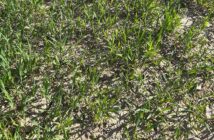Growers in the north should consider the premium opportunities on offer when making their wheat variety choices for the coming seasons, was the message from Cam Murray, northern regional technical manager for Hutchinsons, at a recent open day at Buston Barns, in Morpeth, Northumberland.
With over 120 farmers attending the event on the 21st June, the topic of wheat variety choice for the coming season was very much at the forefront of visitor’s minds.
Currently, biscuit and soft wheat milling premiums are comparable or above those for Group 1 & 2’s, so growers should be looking at what varieties will give them access to these premium opportunities, whilst still driving for high yields and a good strong agronomic package, explained Mr Murray to visitors at the open day.
He noted that biscuit wheats KWS Barrel and KWS Basset have shown particularly high yields in the north.
“Barrel is classified as a uks soft wheat for export but it is not suitable for distilling. Barrel’s northern yield is the highest on the list at 109% so a worthy contender. It’s more suited to later drilling as there is a yield penalty with this variety if drilled too early, with yield potential dropping off to 98%. It is suited to both first and second wheat positions.”
“Basset, the brother of Barrel, is potentially a very useful soft wheat with biscuit making credentials. A northern yield of 101% makes it a solid performer. This variety suits the early drilling slot.”
Both varieties are resistant to OWBM, with good resistance to yellow rust and mildew. However Barrel only has a rating of 4 for Septoria tritici so it’s less suitable for areas with high septoria pressure where more careful management is needed.
Mr Murray believes that Zulu is still a good contender, and although it has softer milling characteristics than Claire, meets the requirements of a Group 3 wheat. Northern growers like this variety as it is also rated for distilling.
“Zulu’s weakness is rust, having succumbed to current races, however as long as growers are aware of this issue it should be easily controlled.”
Amongst the soft group 4’s LG Sundance and LG Motown are attracting a lot of attention, he said.
“LG Sundance tends to give slightly low specific weights, but is rated a medium for distilling. Its septoria rating of 7.3 is the highest on the list, and coupled with an excellent yellow rust rating of 9, it is good option for growers who have large acreages to cover.”
“However for all these good specs you do pay a small price in reduced yield on this variety.”
“The other new variety out of the Limagrain stable is LG Motown, and at 104 in the north outperforms its “Sundance” stable mate. Being a -1 for ripening will make LG Motown attractive to growers north of the border and a Hagberg of 217 gives it a strong resistance to sprouting.
“At a 5.8 for septoria it’s behind that of Sundance, and will need appropriate management. This variety prefers the later drilling slot.”
Also worth considering in this medium distilling category is Hardwicke, which has looked very good in trials and yielded up around 104%. Although for this autumn there is a limited amount of seed available.
Mr Murray acknowledged that Leeds and Viscount are still popular varieties for the north. “Viscount is one of the barometer varieties, and is a proven reliable and consistent variety up here. At a 103% it’s hard to look past this variety as one of the better performers.”
“Leeds has always done well on light soils down to its Istabraaq parentage, although it is tall and leggy and very susceptible to mildew, so needs careful management. But Leeds has a good Hagberg of 206, so is less prone to sprouting.”
“In a low input or organic situation, it would be hard to beat Revelation. It’s proven to be agronomically quite tough with its good overall disease package but it’s important to take into account the +3 for maturity.”
“Another option here could be LG Sundance with the 7.3 and 9 for septoria and rust respectively.”
With regards to the Group 2’s KWS Lilli (104%) out yields Siskin (101%) in the north, he said. “There’s a marketing opportunity to grow this variety for salmon farming. Yields are comparable to the soft group 4 so grow and treat this as a soft group 4, drive the yield and then look for a premium as a dynamic quality group 2.”
Candidate variety RGT Universe will be available in small amounts and will suit those looking to early drill in late August – beginning of September, added Mr Murray.




